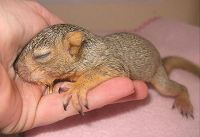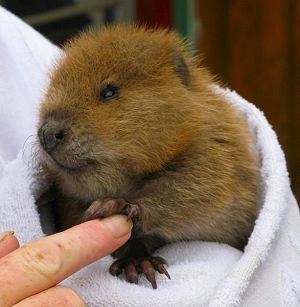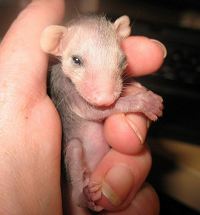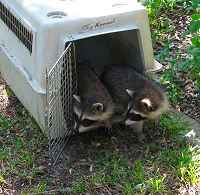|
I found a wild baby animal!
Can I keep it?
by Birgit Sommer, May 2010, edited/updated 5/19/2016
A common call received by the Rainbow Wildlife Rescue is, “I have found an abandoned baby or injured wild animal.”
The most common questions asked are, “What do I need to do with it?”, “What can I feed it?” and then the most dreaded question “I love animals so much! It's soooo cute, can I keep it?”
That's where my job gets tough, because the answers are often not the ones people want to hear.
|
 |
THE LAW, UNFAIR?
People that find a wild animal are very excited about it and most of them have no idea that there are laws making it illegal to possess even as much as a tiny hairless squirrel that fell out of the nest. That would be against State law in most US States. It gets even worse when it comes to birds. Migratory birds cross borders which would make it a federal offense to possess one for even one day.
On the other hand, it also requires us rehabilitators to work hard on obtaining these permits so we can provide professional care for these animals.
Keeping wildlife you find in the environment can present many challenges including what enclosure is suitable. Many owners of yachts in San Diego often find marine mammals in distress while boating and can call the San Diego zoo for assistance in rehabilitating them.
But let's get back to the excited finders of the wildlife in need. Well minded folks typically show the cute baby raccoon or squirrel or baby bird to friends and family and share pictures on Facebook or other social media to figure out to help that critter.
In the meantime they provide the wrong diet and care to an already distressed animal which often has fatal consequences. Another unfortunate outcome occurs when just one of these many people out there seeing your posts and pictures or maybe a neighbor does not agree with what you are doing and calls law enforcement.
 |
As a result the illegal animal will most likely be confiscated and with a little luck turned over to a wildlife rehabilitator. If no one is available however or the Game Warden is in a rush, the animal will be euthanized. In addition you will have to pay a hefty fine and end up with an entry in your records.
Not to mention the heartbreak and devastation many folks go through because they have grown attached to the animal.
Believe me, I personally have been there. I received a class c misdemeanor ticket and a fine over $155 for the illegal possession of a squirrel that I tried to rescue after a bad storm destroyed the nest and killed the mother. The Game Warden came, gave me the ticket and killed the baby. I do not wish this devastation and heartache to anyone! On top of it I also was barred for a full year from obtaining that very permit because of the fine... |
After that year has passed however, I finally obtained both, state and federal permits. Now, 15 years and thousands of animals later I feel I have to share this information with you, so you can learn from my experience and pass it on as well.
Songbirds and birds of prey are protected by Federal law and have fines of $15,000 up and jail time. Nests and feathers of songbirds and birds of prey are protected as well.
Wildlife laws are made not only to protect native wildlife, but to also protect the general public from injuries and diseases, mostly rabies. In almost every case, keeping a wild animal is illegal. Native wildlife species are protected by state laws, federal laws, or both. Again, to keep a wild animal in captivity for any length of time, for any reason, requires a special permit. Most cities and many counties have passed local ordinances that prevent individuals from keeping wild animals in captivity.
DISEASES
Even as a baby, these animals can be carriers of a large number of zoonotic diseases and parasites communicable to humans and household pets. Diseases such as rabies, Lyme disease, roundworms and tuberculosis are just a few. If you or any member of your family is scratched or bitten, that animal is required to be euthanized and tested for rabies, because tests on live animals are not possible.
I wrote an article about rabies, because there are so many myths and misunderstandings out there, I felt I had to clarify some of them. Please read more about it HERE.
WHAT DOES "WILD" REALLY MEAN?
Have you ever thought about the difference between wild and domesticated animals? Domesticated animals such as cats and dogs seek human company and enjoy to be petted, cuddled and played with. They depend on their human owners for food, housing and leadership.
Wild animals are considered wild because they are species that have not been domesticated and therefore have a natural fear of everything that's physically bigger than them, including us, their biggest predator. It doesn't matter if you raised the animal from his first day of life, they have different instincts than domestic species.
This will become a factor as they mature into an animal that can be very hard to manage and very high maintenance. The cute baby animal you wanted to save with great intentions is now in danger of being confiscated, killed, relegated to living in a cage, or even harming someone.
There is also a tremendous and painful emotional separation that can occur - not just for you, but for the now confused animal! It just isn't fair and it derives from a selfish desire. We must think "long term". |
 |
WILD BABIES
People trying to help wild animals sometimes receive serious injuries. Many expect an animal to recognize their kind intentions and love and do everything in their power to convince the scared animal to not be afraid. Yet that fear is the key to their survival, instilled in their genes throughout evolution.
Sometimes young animals become imprinted and dependent up their human captors and if released back into the wild may become a nuisance or simply die because of the human interference in their lives that prevented them from learning critical survival skills.
In addition, wild animals deserve the best possible care which requires expert training and knowledge considering that each species has specialized needs. Orphans require individual diets and formulas to grow strong and healthy.
They need to learn survival skills, how to recognize and find food, recognize predators, how and where to establish their living quarters before they are released back into the wild. Most young animals need to be raised in the company of their own kind for proper social and behavioral development.
LETTING GO
 |
A lot of folks who ended up caring for a wild animal had plans to release the animal once it has grown or has recovered from its injuries but were not able to do so because they have grown too attached and were not capable of putting the animal's needs before their own desires.
Wildlife rehabilitators however have an advantage when they return their residents to the wild - they have years of experience in letting go and are happy for the animal. It's a privilege to return nature's very own.
They are not ours. Wildlife rehabilitators do their job selflessly for the animals, not their own feelings, gain or entertainment. |
Enjoy wildlife, but leave animals to their natural habitats. Not only for the animal’s well being, but for human safety. Allow wild animals to live the way they were meant to live, wild and free.
To make a long answer short: No, you can't keep it! If you really care please learn how to help, when to help, and when maybe not to help. Sometimes "help" can be a death sentence.
Disclaimer: The information provided in this article is the property of the Rainbow Wildlife Rescue. The RWR holds all copyright interests in such material, unless specifically indicated. Permission to reprint is given with credit to the Rainbow Wildlife Rescue and noted authors. |

